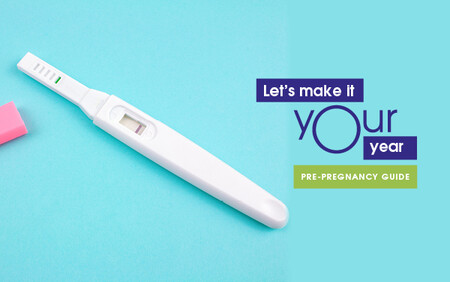
Let's Make It Your Year - Week 3
It’s a common misconception that fertility issues are caused by the female. It takes two to tango!
Causes of infertility are attributed to 35% female factors, 35% male factors and 20% combined female and male factors, with unexplained infertility occurring in about 10% of cases.
This week, we will look at the most common female and male fertility conditions. We have also included our new Female Fertility quick assessment, to understand if any factors are may be affecting your chances of conceiving.
Common fertility issues
Women:
Ovulation issues or irregular periods
- Women who don’t ovulate, often have irregular or no periods.
- Common causes include PCOS, obesity or low body weight, thyroid dysfunction or low ovarian reserves.
- Treatment will often depend on the cause but may include diet and lifestyle changes or simple fertility drugs to trigger ovulation.
Polycystic ovarian syndrome (PCOS)
- PCOS is a common hormone problem and the leading cause of infertility
- Symptoms include irregular or no periods, heavy painful periods, increased hair growth, acne and obesity.
- PCOS can be treated by managing the symptoms through diet and lifestyle changes, ovulation induction drugs or in difficult situations, IVF treatment may be necessary.
Endometriosis
- Endometriosis is a condition where the cells that line the uterus grow in places outside the uterus often distorting the tubes and ovaries.
- When these cells grow outside, they cause the body to resist foreign material, such as sperm, or block the release of eggs.
- Symptoms include painful periods, pain during intercourse and premenstrual spotting.
- Endometriosis can sometimes be treated with laparoscopic surgery.
Uterine fibroids
- Fibroids are benign lumps of tissue that can grow around and inside the uterus.
- Their size and location will determine if they affect your fertility and if they will need to be removed surgically.
- Fibroids don’t often cause symptoms but depending on where the fibroid is you may experience heavy or prolonged periods, pain or swelling in your pelvic area, passing urine more often than normal or constipation.
Men:
Abnormal sperm production
A common cause for couples having problems is where the man has a lower than normal, or no sperm production at all. Most of the time the cause for this is never identified but your Doctor will advise further testing to see if any cause can be found.
A very low or absent sperm count, where there are no sperm at all, there is more likely to be a specific cause. This could be a genetic problem affecting production of sperm or a blockage affecting sperm release.
Severe sperm production
- Sperm antibodies are not common but can interfere with motility and fertilisation of the sperm.
- In cases where there is a problem with the number or quality of sperm, an advanced form of IVF, called ICSI, is usually recommended.
Fertility tests
Women:
Ovarian reserve (AMH) test
- An AMH test looks at the level of the Anti-Mullerian Hormone in your body, which is a good indicator of how many eggs you have left, and fertile years ahead.
- However, it is important to remember this test doesn’t determine the quality of those eggs and women with a low AMH level will have the same chance of conceiving naturally.
Ultrasound scan:
- Checks the lining of a your womb and overall structure
- Helps diagnose any underlying conditions such as fibroids or ovarian cysts
Men:
Semen analysis
- The semen analysis test accurately measures the number of sperm, their motility (ability to move), morphology (size and shape), and the volume and consistency of the sample.
- A normal semen analysis result will show a sperm count of at least 15 million sperm per ml, with at least 40% of the sperm showing forward progressive movement.
Female fertility online assessment
By answering 7 simple questions, this online tool is designed to given you an indication of whether there are any factors that might be affecting your chance of falling pregnant and whether you should consider seeking the advice of a fertility specialist for further assessment.

Omega-3 fatty acids
Omega-3 Fatty Acids have been known to promote fertility, and a healthy pregnancy. The Dietologist's Maple, Ginger and Sesame Salmon is packed with healthy goodness and omega-3!

Warrior Princess Shape Workout
Get fit and healthy with Warrior Princess' full body Shape Workout!

Mindfulness Podcast: Shame
Judith Krause covers the topic of shame - but not in the way you think.
Need a fertility friend?
During this programme you can head to our private Facebook group and chat with others who are trying to conceive. Hearing the experiences of other people on a similar fertility journey can be an invaluable source of support and encouragement.
Free information evenings
Hear from our fertility specialists on what factors affect your fertility and what you can do to maximise you chances of conceiving.
In case you missed it last week: Week 2 of Let's Make it Your Year >>>>